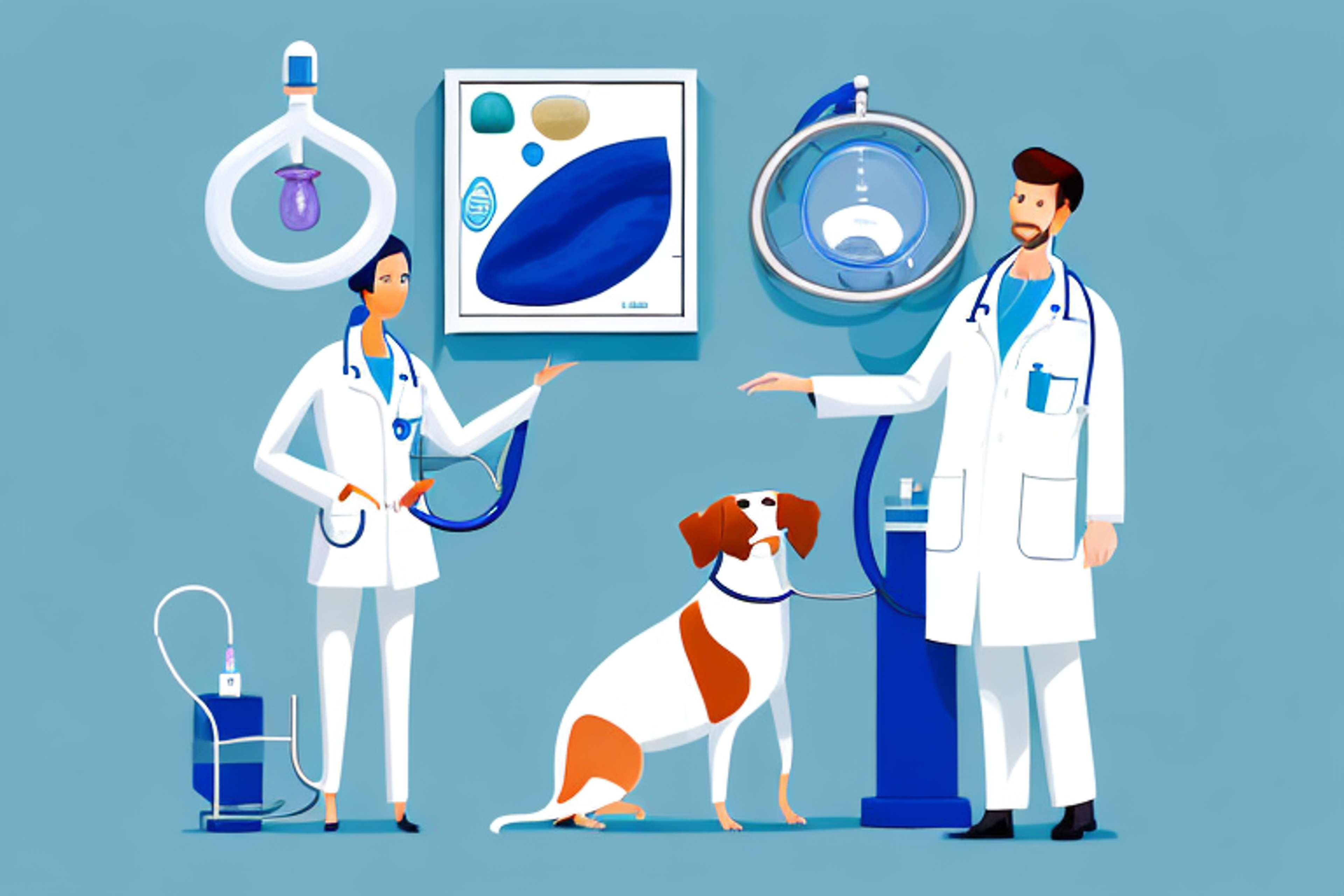How Long Is Schooling for a Veterinarian? A Guide to Veterinary Education
If you're considering a career as a veterinarian, it's important to understand the education requirements.
Posted April 10, 2025

Table of Contents
If you're passionate about working with animals and interested in pursuing a career in veterinary medicine, it's important to understand the education requirements involved. Becoming a veterinarian requires a significant investment of both time and money, but the rewards of helping animals and their owners can be profound. So how long is schooling for a veterinarian, exactly, and what does it entail? In this comprehensive guide, we'll cover all the basics of veterinary education, from the prerequisites for admission to the licensing and certification process after graduation.
The Importance of Learning Basic Science Principles in Veterinary Education
One of the most important components of a veterinary education is learning the fundamental principles of biology, chemistry, and anatomy. Many vet schools require applicants to have completed a certain number of science-intensive courses as a prerequisite for admission. During veterinary school, students continue to build on their knowledge of these subjects, studying the nuances of animal physiology and disease. It's important for aspiring veterinarians to understand the scientific principles that underlie the care of animals in order to make sound medical decisions and provide effective treatment.
Furthermore, a solid foundation in basic science principles is essential for veterinarians to stay up-to-date with the latest advancements in veterinary medicine. As new technologies and treatments are developed, veterinarians must be able to understand the underlying scientific principles in order to effectively incorporate them into their practice. Without a strong understanding of basic science, veterinarians may struggle to keep up with the latest developments and provide the best possible care for their animal patients.
Understanding the Pre-Veterinary Course Requirements
Before applying to veterinary school, candidates must meet a variety of course requirements that demonstrate their aptitude for science and animal care. These might include courses in biology, chemistry, physics, and math. In addition, many vet schools require applicants to have completed some animal-related work experience, such as shadowing a practicing veterinarian or working with animals in a research or clinical setting. Meeting these requirements can take several years, depending on the individual's background.
It is important for pre-veterinary students to not only focus on meeting the course requirements, but also to gain practical experience working with animals. This can include volunteering at animal shelters, participating in animal rescue organizations, or working on a farm. These experiences not only demonstrate a commitment to animal welfare, but also provide valuable hands-on experience that can be beneficial in veterinary school and in future careers as a veterinarian.
The Admission Process into Veterinary School: Tips and Tricks
Once the prerequisite coursework and experience have been completed, it's time to apply to veterinary school. This process can be highly competitive, and successful applicants need to put together a strong portfolio that showcases their academic achievements, work experience, and personal qualities. In addition, many vet schools require applicants to complete a standardized test, such as the GRE. Aspiring veterinarians should be prepared to put forth a great deal of effort to make themselves stand out in this rigorous admissions process.
One important aspect of the veterinary school admissions process is the interview. Many schools require applicants to participate in an interview, either in person or via video conference. This is an opportunity for the admissions committee to get to know the applicant on a more personal level and assess their communication skills, professionalism, and passion for the field. It's important for applicants to prepare for the interview by researching the school, practicing common interview questions, and dressing professionally. A strong interview performance can make a big difference in the admissions decision.
A Comprehensive Overview of Veterinary School Curriculum
After successfully gaining admission to veterinary school, the real work begins. The curriculum typically lasts four years and covers a wide range of topics, such as animal anatomy and physiology, pharmacology, surgery, and epidemiology. Students are required to complete both classroom instruction and hands-on training in clinical settings. The workload can be intense, and students must be prepared to invest a significant amount of time and energy in their studies.
The Role of Clinical Rotations in Veterinary Education
One key component of veterinary school is the clinical rotation, which gives students hands-on experience in a variety of settings. During clinical rotations, students work under the close supervision of licensed veterinarians, observing and participating in real-world cases. Rotations may take place at veterinary clinics, zoos, or research facilities, and can provide valuable exposure to different types of animals and medical scenarios. Clinical rotations are also an opportunity for students to network with professionals in the field and gain insights into various specializations.
Demystifying the Licensing and Certification Process for Veterinarians
Once veterinary school is complete, graduates must go through a rigorous licensing and certification process before they can begin practicing. This process typically involves passing both state and national board exams, as well as completing continuing education requirements to maintain licensure. The specific requirements vary from state to state, but aspiring veterinarians should be prepared to invest additional time and money in this final phase of their education.
Exploring Specializations Within the Veterinary Field
After becoming licensed and certified, veterinarians have a wide range of career paths to choose from. Some may choose to work in private practice, while others may opt for research or a position in academia. Many veterinarians also specialize in a particular area of animal health, such as oncology, neurology, or cardiology. Specializing typically requires additional training and certification, but can provide increased job opportunities and higher salary potential.
Insight into the Job Outlook and Potential Earnings for Veterinarians
The job outlook for veterinarians is generally positive, with demand expected to remain stable or grow in the coming years. In terms of earnings, salaries for veterinarians can vary widely depending on factors such as location, type of employment, and level of specialization. According to data from the Bureau of Labor Statistics, the median annual salary for veterinarians was $93,830 as of May 2020. Veterinarians who specialize in areas such as surgery or internal medicine may earn considerably more.
Tips on Starting Your Own Veterinary Practice After Graduation
For many veterinarians, owning their own practice is a dream come true. Starting a veterinary practice can be a complex and challenging process, however, requiring careful planning, financing, and marketing. Successful veterinary business owners must be able to balance the demands of patient care with the realities of running a small business. Those who are interested in starting their own practice should consider seeking the guidance of experienced veterinary entrepreneurs and investing in continuing education courses on business management.
Common Challenges Faced by Veterinarians and How to Overcome Them
Like any career, veterinary medicine is not without its challenges. Veterinarians may face difficult ethical decisions, challenging cases, and emotional stress when working with sick or injured animals. They may also face financial and managerial challenges when starting or running a practice. To overcome these obstacles, veterinarians can seek support from colleagues and mentors, develop strong communication skills, and invest in strategies for self-care and stress management.
The Future of Veterinary Medicine: Technological Advancements and Innovations
The field of veterinary medicine is constantly evolving, with new technologies and innovations emerging all the time. Advances in genetic sequencing, telemedicine, and artificial intelligence are poised to transform the way veterinarians approach animal care in the years to come. Veterinarians who stay up-to-date on these developments and adapt to changing trends will be well-positioned to succeed in the future.
Balancing Compassion and Professionalism in the Veterinary Industry
For veterinarians, providing compassionate care for animals is both a calling and a professional duty. However, this can be challenging in an industry that is often characterized by high-stakes decision making and difficult medical situations. Veterinarians must learn to balance their compassion for animals with a commitment to upholding the standards of their profession. This may involve seeking support from colleagues and mentors, developing strong communication skills, and practicing self-care to avoid burnout.
Best Practices for Maintaining a Work-Life Balance as a Veterinarian
Like many healthcare professionals, veterinarians can struggle to find a healthy balance between their work and personal lives. This is especially true for those who own their own practices, as the demands of business ownership can be all-consuming. To maintain a healthy work-life balance, veterinarians should prioritize self-care, set boundaries for their time and energy, and seek support from trusted friends and family members. Working with a financial advisor and implementing streamlined business practices can also help to reduce stress and create more free time.
Resources Available for Continuing Education Within the Field of Veterinary Medicine
Continuing education is essential for veterinarians who want to stay up-to-date on the latest developments in their industry and maintain their licensure. Fortunately, there are many resources available to help veterinarians continue their education even after they've completed their formal training. These may include conferences, workshops, online courses, and seminars. By making a commitment to ongoing learning, veterinarians can stay at the forefront of their field and provide the best possible care for their patients.
In conclusion, becoming a veterinarian requires years of education and hard work, as well as a deep commitment to animal welfare. By understanding the prerequisites for admission, the rigors of veterinary school, and the challenges and opportunities of the profession, aspiring veterinarians can set themselves up for success. And by staying up-to-date on new technologies and innovations, seeking support from colleagues, and prioritizing work-life balance, they can continue to thrive in this rewarding and dynamic field.











